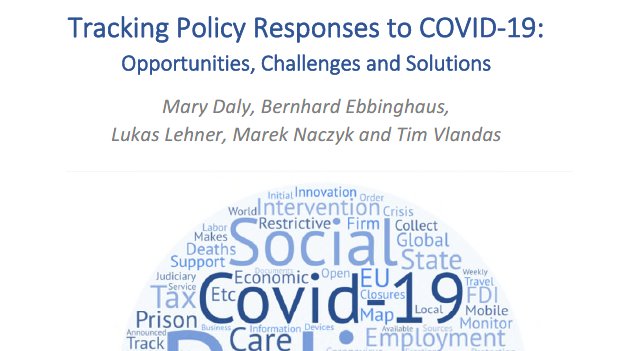We published today our @DSPI_Oxford #Supertracker Policy Brief: “Tracking Policy Responses to COVID-19: Opportunities, Challenges and Solutions”, examining #Covid19 policy trackers, existing information gaps, and potential synergies for data analyses 1/.. https://supertracker.spi.ox.ac.uk/assets/STBrief-1.pdf">https://supertracker.spi.ox.ac.uk/assets/ST...
To document policy responses and their consequences in real time during the #COVID19 crisis, researchers around the globe have developed COVID-19 specific policy trackers and fielded new surveys to map individual attitudes and behavioural responses across countries.
Mary Daly, @B_Ebbinghaus, Marek Naczyk, @timvlandas and I have analysed the (so far) 126 policy trackers & 44 surveys that we have collected and categorised over the past months in the Oxford Supertracker and discuss implications for future research and policy analysis.
1) Demand
Policy trackers on #COVID-19 provide an immensely valuable public good by facilitating comparative social research and evidence-based policy-making. The recent boom in demand is evidenced by skyrocketing Google searches for “policy tracker[s]” during 2020.
Policy trackers on #COVID-19 provide an immensely valuable public good by facilitating comparative social research and evidence-based policy-making. The recent boom in demand is evidenced by skyrocketing Google searches for “policy tracker[s]” during 2020.
2) Supply
More than 1/3 of policy trackers originate from academic institutions, 1/4 from IOs, followed by NGOs, think tanks and by a few (sub)national agencies. Global companies leverage the rise of big data to produce trackers on significant behavioural aspects.
More than 1/3 of policy trackers originate from academic institutions, 1/4 from IOs, followed by NGOs, think tanks and by a few (sub)national agencies. Global companies leverage the rise of big data to produce trackers on significant behavioural aspects.
3) Coverage
The large majority (82 out of 126, or 65%) of the policy trackers included in the Oxford Supertracker (31 August 2020) have a global scope, though many of them do not systematically cover all UN recognized countries.
The large majority (82 out of 126, or 65%) of the policy trackers included in the Oxford Supertracker (31 August 2020) have a global scope, though many of them do not systematically cover all UN recognized countries.
Around 15% of trackers focus on particular world regions, most notably Africa, Asia and the EU or Europe. In addition, the Supertracker includes 25 national trackers (about 20%) from anglophone countries: Australia, Canada, the UK and most often the US (typically on US states).
4) Opportunities for tracker users
-) The country-by-country compilation in the Supertracker facilitates triangulation of information from different sources.
-) The country-by-country compilation in the Supertracker facilitates triangulation of information from different sources.
-) The temporal dimension of some databases allows more fine-grained analyses both of the specific context in which government measures have been adopted and of the exact impact over those measures, e.g through quasi-experimental research designs studying treatment effects.
5) Opportunities for tracker authors
-) Greater coordination between authors of trackers could help them define a clearer division of labour and make databases more complementary.
-) Greater coordination between authors of trackers could help them define a clearer division of labour and make databases more complementary.
6) Challenges
-) Comparability and combinability may be limited due to different conceptualisation and data structures.
-) Coverage and validity may be limited due to capacity constraints of data producers.
-) Comparability and combinability may be limited due to different conceptualisation and data structures.
-) Coverage and validity may be limited due to capacity constraints of data producers.
-) Policy impact evaluation is currently limited due to a lack of up-to-date individual or household panel data on outcomes.
-) Maintaining some degree of diversity in databases that track the same phenomena is desirable to meet the theoretical or practical needs of users.
-) Coordinating at an advanced stage of data collection may not be feasible and might only further strain limited resources.
-) Coordinating at an advanced stage of data collection may not be feasible and might only further strain limited resources.
7) Solutions - we call for:
-) Stepping up efforts to collect & categorize information resources in Oxford Supertracker
-) Working with data producers to close information gaps & use synergies
-) Increasing user accessibility through direct access to content of datasets
-) Stepping up efforts to collect & categorize information resources in Oxford Supertracker
-) Working with data producers to close information gaps & use synergies
-) Increasing user accessibility through direct access to content of datasets
Our webinar and discussions with authors of key policy trackers have informed our analysis. Thanks for inputs to @Ugentilini @sebkoenigs @AGarnero @philippepochet @TobyMPhillips @jpazvd @tigranshmis.
We look forward to continuing the discussion on tracking policy responses to #COVID19. You can subscribe here to receive regular updates on new sources:
#subscribe">https://supertracker.spi.ox.ac.uk/ #subscribe ">https://supertracker.spi.ox.ac.uk/...
#subscribe">https://supertracker.spi.ox.ac.uk/ #subscribe ">https://supertracker.spi.ox.ac.uk/...

 Read on Twitter
Read on Twitter
![1) DemandPolicy trackers on #COVID-19 provide an immensely valuable public good by facilitating comparative social research and evidence-based policy-making. The recent boom in demand is evidenced by skyrocketing Google searches for “policy tracker[s]” during 2020. 1) DemandPolicy trackers on #COVID-19 provide an immensely valuable public good by facilitating comparative social research and evidence-based policy-making. The recent boom in demand is evidenced by skyrocketing Google searches for “policy tracker[s]” during 2020.](https://pbs.twimg.com/media/Eh3BtnOWkAIJKIY.jpg)




